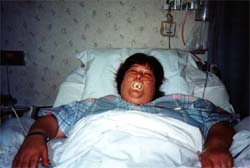Marketing Risky Surgery is of questionable
ethics and may be dangerous to the health of the public!
by Sue Widemark
As a part of an advertising campaign launched by the Alvarado
Clinic in partnership with the Vista  Company
(manufacturer of laproscopic instruments) reported on as a success in early
2000, Carnie Wilson returned to the Alvarado clinic to make an
infomercial along with Dr Alan Wittgrove, her surgeon. This infomercial is
made available to any Weight Loss Surgery Clinic affiliated with SpotlightHealth.
Company
(manufacturer of laproscopic instruments) reported on as a success in early
2000, Carnie Wilson returned to the Alvarado clinic to make an
infomercial along with Dr Alan Wittgrove, her surgeon. This infomercial is
made available to any Weight Loss Surgery Clinic affiliated with SpotlightHealth.
In the infomercial, Carnie (pictured at right immediately after Weight Loss
Surgery) who lost 130 lbs since her proximal gastric
bypass surgery in August 1999 talks about the profound effect
the surgery has had on her life.
Her surgery on the internet was a part of an advertising
campaign launched by Vista and SpotlightHealth August 1999. The early campaign was centered
a website called, www.adoctorinyourhouse.com
(has now been changed to
www.spotlighthealth.com ) Since then, Carnie and her surgery have been given
a lot of publicity. As a result, Dr Wittgrove (her surgeon) went from doing 9 Gastric
bypasses a week to doing 12-15 gastric bypasses a week and is booked as far as
18 months ahead for surgeries..
It should be noted that there are rules to which drug companies must
adher when advertising on TV - they must state the risks of the medication, but
these rules do not apply to Weight Loss Surgery and thus, the ads often state no
risks at all, giving people a misleading picture about what the risks of the
surgery are.
Carnie also offers herself for speaking engagements at a $35,000 fee.
"Self Magazine" has remarked that whenever Carnie Wilson appears on TV, "phones
of the offices of bariatric surgeons ring off the hook!"
Selling Weight Loss surgery as a commodity is not new and was
actually pioneered by Dr Fobi (inventor of the Fobi pouch).
Fobi approached famous people (he did Roseanne's gastric bypass,
for example) but also ran colorful commercials on local TV
stations for his services. Since then, other providers have joined in the
ad campaigns, among them, BTC and "The Wish Center".
This brings into question the ethics of selling any risky surgery as it were
a new type of makeup, a question which we may be facing more and more.
About this, the American Medical Assn included in a comment article in April
2003:
"You have physicians
advertising like crazy. You can't watch television without seeing an ad," said
Edward H. Livingston, MD, a professor of surgery at the University of Texas
Southwestern Medical Center in Dallas. -This is the highest paying general
surgical procedure there is, and a lot of patients will pay."
(1762 JAMA, April 9, 2003-VoL 289, No. 14)
It's one thing to buy a used car which is portrayed through rose colored
glasses - if it dies when you get off the lot,
it's an expensive lesson but one you live from. But if a medical procedure
you have bought, fails, it may be life threatening especially one as
irreversible as the gastric bypass. I would hope to see restrictions and
safeguards on this type of advertising.
In Susan Powter's new book, THE POLITICS OF STUPID, she states that the
Weight Loss industry in general entices customers on false hopes (which she
calls "the hype of hope"). Many people buy Weight Loss surgery because of
the TV ads which picture the surgery as "the easy way out". However, after
the first year, all patients find out that it's diet and exercise which keep off
the weight loss. Nothing new there. Same old thing people must do without
having surgery.
Source:
www.spotlighthealth.com
www.susanpowteronline.com

Weight Loss
Surgery Information Center
 Company
(manufacturer of laproscopic instruments) reported on as a success in early
2000, Carnie Wilson returned to the Alvarado clinic to make an
infomercial along with Dr Alan Wittgrove, her surgeon. This infomercial is
made available to any Weight Loss Surgery Clinic affiliated with SpotlightHealth.
Company
(manufacturer of laproscopic instruments) reported on as a success in early
2000, Carnie Wilson returned to the Alvarado clinic to make an
infomercial along with Dr Alan Wittgrove, her surgeon. This infomercial is
made available to any Weight Loss Surgery Clinic affiliated with SpotlightHealth.